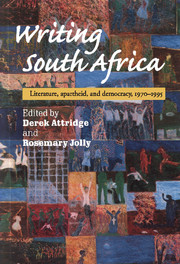Book contents
- Frontmatter
- Contents
- Contributors
- Acknowledgements and note on references
- South Africa, 1930–1996: a chronology
- Maps
- 1 Introduction
- 2 Interrogating silence: new possibilities faced by South African literature
- 3 I am dead: you cannot read: André Brink's On the Contrary
- 4 Endings and new beginning: South African fiction in transition
- 5 The post-apartheid sublime: rediscovering the extraordinary
- 6 Postmodernism and black writing in South Africa
- 7 Shame and identity: the case of the coloured in South Africa
- 8 A man's world: South African gay writing and the State of Emergency
- 9 The final safari: on nature, myth, and the literature of the Emergency
- 10 Interview
- 11 Speech and silence in the fictions of J.M.Coetzee
- 12 ‘Dialogue’ and ‘fulfilment’ in J.M. Coetzee's Age of Iron
- 13 Interview
- 14 Inside out: Jeremy Cronin's lyrical politics
- 15 Spinning out the present: narrative, gender, and the politics of South African theatre
- 16 South African theatre in the United States: the allure of the familiar and of the exotic
- Position papers
- Select bibliography: South African literary writing in English, 1970–1995
- Index
6 - Postmodernism and black writing in South Africa
Published online by Cambridge University Press: 05 July 2011
- Frontmatter
- Contents
- Contributors
- Acknowledgements and note on references
- South Africa, 1930–1996: a chronology
- Maps
- 1 Introduction
- 2 Interrogating silence: new possibilities faced by South African literature
- 3 I am dead: you cannot read: André Brink's On the Contrary
- 4 Endings and new beginning: South African fiction in transition
- 5 The post-apartheid sublime: rediscovering the extraordinary
- 6 Postmodernism and black writing in South Africa
- 7 Shame and identity: the case of the coloured in South Africa
- 8 A man's world: South African gay writing and the State of Emergency
- 9 The final safari: on nature, myth, and the literature of the Emergency
- 10 Interview
- 11 Speech and silence in the fictions of J.M.Coetzee
- 12 ‘Dialogue’ and ‘fulfilment’ in J.M. Coetzee's Age of Iron
- 13 Interview
- 14 Inside out: Jeremy Cronin's lyrical politics
- 15 Spinning out the present: narrative, gender, and the politics of South African theatre
- 16 South African theatre in the United States: the allure of the familiar and of the exotic
- Position papers
- Select bibliography: South African literary writing in English, 1970–1995
- Index
Summary
I am concerned in this chapter not with the validity or propriety of postmodernist theory and practice with regard to South African literature taken in its aggregate. That debate has been going on for some time now within the country and in my opinion remains inconclusive. My purpose is to insist that in South Africa there exists an unhealed – I will not say incurable – split between black and white writing, between on the one side an urgent need to document and to bear witness and on the other the capacity to go on furlough, to loiter, and to experiment. This split, apart from the linguistic medium, will find no ready analogy in the difference between, say, Afrikaans and English literatures, a division which is only comparable to the difference between regional literatures in the United States, especially between southern and northern, and between rural and urban writing, a difference which is largely a matter of a constellation of certain themes and preoccupations.
Though often treated as natural, sometimes as a positive sign of our cultural diversity and richness, and as such a reason for celebration rather than regret, this difference between black and white writing can also be read as a sign of social disparity and technological discrepancy. In a post apartheid South Africa it is clearly a cause for embarrassment. It exists on the one side as a reminder of historical neglect and the impoverishment of black writing and on the other of cultural privilege and opportunity in the case of white writing.
- Type
- Chapter
- Information
- Writing South AfricaLiterature, Apartheid, and Democracy, 1970–1995, pp. 75 - 90Publisher: Cambridge University PressPrint publication year: 1998
- 12
- Cited by



